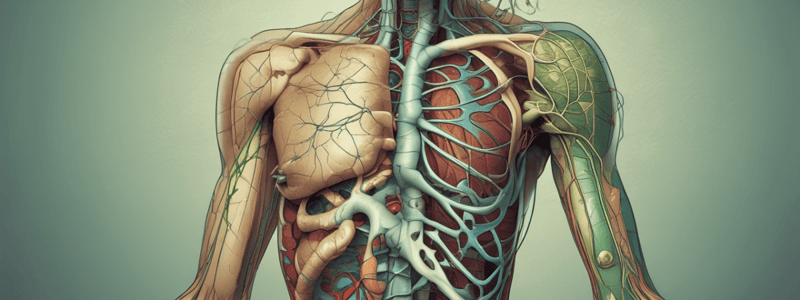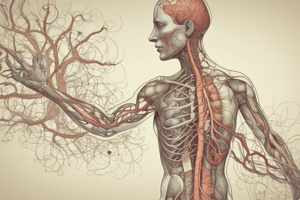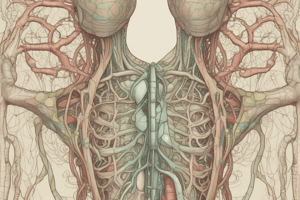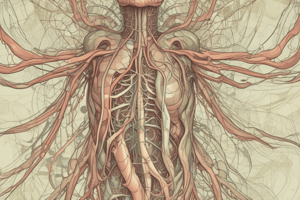Podcast
Questions and Answers
What is the primary purpose of the lymphatic system?
What is the primary purpose of the lymphatic system?
- To carry oxygen to cells
- To fight off infections
- To feed cells around blood vessels
- To collect and return fluid to the blood (correct)
Where do lymphatic vessels typically start?
Where do lymphatic vessels typically start?
- From blood vessels directly
- From the heart
- From cells around blood vessels
- Out of nothing (correct)
What is the typical location of an infection?
What is the typical location of an infection?
- In the lymphatic vessels
- Inside the blood vessels
- In the cells around blood vessels
- Outside of the blood vessels, in the tissue (correct)
Why do infections usually stay localized?
Why do infections usually stay localized?
What is an example of how people typically get infected?
What is an example of how people typically get infected?
What is the main reason why bacteria or viruses do not enter the blood through a cut?
What is the main reason why bacteria or viruses do not enter the blood through a cut?
What happens to the fluid that is collected by the lymphatic vessels?
What happens to the fluid that is collected by the lymphatic vessels?
What is an example of a foreign invader that can cause an infection?
What is an example of a foreign invader that can cause an infection?
Where does an infection usually stay in the body?
Where does an infection usually stay in the body?
What is the primary function of the adaptive immune system?
What is the primary function of the adaptive immune system?
Why don't B and T cells react to infections in the tissues?
Why don't B and T cells react to infections in the tissues?
What is the main reason B cells and T cells require a special environment to develop?
What is the main reason B cells and T cells require a special environment to develop?
What is the primary function of the lymphatic vessels?
What is the primary function of the lymphatic vessels?
What happens to the bacteria and macrophages in the lymphatic vessels?
What happens to the bacteria and macrophages in the lymphatic vessels?
What is the purpose of the lymph nodes in the immune system?
What is the purpose of the lymph nodes in the immune system?
What is the main difference between macrophages and B and T cells?
What is the main difference between macrophages and B and T cells?
What is the ultimate destination of the fluid that passes through the lymph nodes?
What is the ultimate destination of the fluid that passes through the lymph nodes?
What is a beneficial side effect of having lymph nodes throughout the lymphatic vessels?
What is a beneficial side effect of having lymph nodes throughout the lymphatic vessels?
What would happen if lymph nodes were not present in the body?
What would happen if lymph nodes were not present in the body?
What is the function of macrophages in lymph nodes?
What is the function of macrophages in lymph nodes?
How many lymph nodes are present in the human body?
How many lymph nodes are present in the human body?
Where are lymph nodes typically located in the body?
Where are lymph nodes typically located in the body?
What is the purpose of a lymph node in the body?
What is the purpose of a lymph node in the body?
Why are lymph nodes important in preventing infections?
Why are lymph nodes important in preventing infections?
What happens to the lymph fluid after it passes through a lymph node?
What happens to the lymph fluid after it passes through a lymph node?
How do doctors often check for swollen lymph nodes?
How do doctors often check for swollen lymph nodes?
Where do the lymph vessels that carry lymph from the stomach join?
Where do the lymph vessels that carry lymph from the stomach join?
What is true about all the lymph that goes back into the bloodstream?
What is true about all the lymph that goes back into the bloodstream?
Flashcards are hidden until you start studying
Study Notes
Lymphatic System and Infection
- The lymphatic system collects fluid squeezed out of blood vessels and returns it to the blood, preventing fluid loss.
- The lymphatic system has additional purposes beyond fluid collection, including helping the body respond to infection.
Infection
- Infection occurs when the body is attacked by a foreign invader, such as bacteria or viruses.
- Infections usually stay localized and do not spread through the blood.
Local Immune Response
- Local immune cells, such as macrophages, fight against bacteria in the tissues.
- The adaptive immune system, consisting of B cells and T cells, provides a more specific and powerful response to infection.
Lymph Nodes and the Adaptive Immune Response
- B cells and T cells require a special environment, such as a lymph node, to develop and specialize against specific invaders.
- Lymph nodes act as a "training camp" for B cells and T cells to respond to infection.
Lymphatic Vessels and Lymph Nodes
- Lymphatic vessels collect bacteria and macrophages carrying bacteria from the tissues and transport them to the nearest lymph node.
- Lymph nodes filter the fluid and bacteria, and macrophages in the lymph node help eliminate any remaining bacteria.
- The lymphatic vessel then continues to carry the filtered fluid back into the blood.
Characteristics of Lymph Nodes
- Lymph nodes are small, approximately 1-25 millimeters in size, and are not considered organs.
- There are approximately 600 lymph nodes in the body, located along lymphatic vessels.
- Lymph nodes can be found in various locations, including the inguinal region, neck, and armpits.
Filtering of Lymph
- Any lymph flowing out of a tissue in the body will pass through at least one lymph node before returning to the blood.
- Lymph nodes act as filters, removing bacteria and debris from the lymph before it re-enters the bloodstream.
Studying That Suits You
Use AI to generate personalized quizzes and flashcards to suit your learning preferences.




